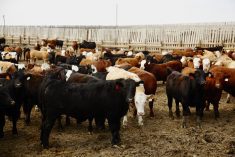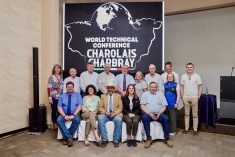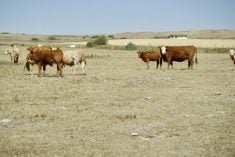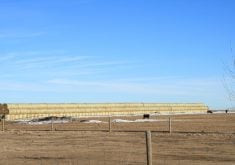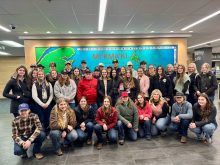With so much information about agriculture and food production easily accessible today, how does the average consumer know what’s true?
By providing students with fact-based information on Canada’s agri-food industry, an Ontario-based classroom education program is empowering youth to think critically about these topics while gaining a better understanding of food production. AgScape is working to raise awareness among Ontario’s students about the Canadian agriculture sector and dispel myths and misinformation.
“It’s really important to us that the information is objective, that it’s fact-based, so that students can make knowledgeable decisions,” says Glenna Banda, AgScape’s executive director. “With social media and influencers that are sharing information that maybe isn’t science-based, we want to help not only give them that fact-based information but also help them think critically so that they can properly assess the other information that is coming to them through those other channels.”
Read Also

Growing Canada’s beef herd: CCA’s priorities working with new federal government
This is my first column since the federal election. The Canadian Cattle Association works with all elected officials and parliamentarians, regardless…
Originally known as Ontario Agri-Food Education, the organization was established in 1991 to bring agricultural education to the classroom. The program was rebranded as AgScape in 2017 and is the province’s member of Agriculture in the Classroom Canada.
“Strategically there’s been some changes to our focus, but we’ve always been working to educate students and help them better understand where their food comes from,” says Banda, noting that this is particularly important in a province with a very large urban population.
“We really want students to see the agri-food sector as a vehicle that can make positive social, economic and environmental impacts and help them really understand that it is a really exciting, fast-paced industry that they can be part of.”
About 50 per cent of the program’s funding comes from the Ontario Ministry of Agriculture, Food and Rural Affairs, with the rest of its support coming through membership and contributions by businesses and commodity organizations interested in classroom agriculture education.
AgScape’s flagship program is the Teacher Ambassador program, targeted at Grades 7 to 12. Certified teachers visit classrooms to deliver free lessons in 12 different topic areas. These range from animal health and welfare and environmental initiatives to food security, economics and technology. Each lesson is aligned with the Ontario curriculum and includes a related career component.
“We try to make sure that whether the students live rurally or in an urban setting that lessons help show them how agriculture directly relates to their life,” says Banda.
Like all of AgScape’s programming, the lessons were developed in collaboration with teachers using science and industry information provided by commodity groups and post-secondary institution partners. This requires materials to be regularly updated with the help of these partners to ensure the information is accurate and current.
Professional development for educators is another area within AgScape’s mandate. In addition to providing sessions for teacher associations, AgScape has an e-learning platform for teachers, The Business of Food. This includes 25 modules and activities to be used with their students.
“The more that we can empower teachers with knowledge about agriculture and food so that they can integrate it into the classroom, the better, because that just helps get that information out there,” says Banda.
Other teacher resources available include free digital and printable classroom resources, such as lesson plans, videos and activity sheets. In 2019, Ontario teachers accessed around 36,000 resources.
AgScape also promotes careers in the agri-food industry. Banda noted that there are four jobs waiting for each graduate of the University of Guelph’s Ontario Agricultural College. The thinkAg Career Competition introduces agriculture-related careers to high school students through hands-on activities run by industry representatives while competing for prizes based on skills such as communication and decision-making. As well, the Growing Careers website links students to AgScape’s YouTube channel, featuring more than 75 videos profiling different careers.
Measuring impact
In the last few years, AgScape has focused more on measuring its impact on participants.
“In 2019, for example, with the Teacher Ambassador program, we more than doubled the amount of lessons that we delivered in the schools,” says Banda. She reported that in the past year, students’ interest in considering careers in agriculture increased by 20 per cent after taking the lessons.
With the Teacher Ambassador program, students and teachers are given surveys before and after the lessons.
“I have always thought about the environment and where our food and plants come from and are grown. However, my experience with AgScape has shown me that there is so much more to agriculture and that it impacts our lives significantly,” a Grade 11 student from Toronto’s Marc Garneau Collegiate Institute wrote in one such survey. “I can make a big impact when it comes to agriculture and AgScape has given me the knowledge and motivation to do so.”
The Business of Food e-learning platform has also received positive responses from teachers. A teacher from the Ontario Ministry of Education’s provincial schools branch called the course “a great opportunity to learn more about the field-to-table movement and it was presented in a way that was inspiring to want to share with my students in my classes.”
With these favourable responses and a rise in demand for programs and resources, Banda says the organization is encouraged by the direction it’s heading and wants to increase these efforts.
“We’re making sure that we’re focused on the sustainability of our organization and growing our funding so that we have the capacity to do that,” she says.
“We also right now have some geographic limitations because to be able to deliver some of the programs we need to make sure we have Teacher Ambassadors that can deliver lessons in all areas,” she continued. “We have a lot of students here, so if we wanted to reach every student in Ontario, we’ve still got a lot of work to do.”
Finding opportunities in challenging times
Even in difficult times, the organization is adapting to reach students. As the majority of AgScape’s activities take place in schools, the closures due to COVID-19 prompted the organization to adjust to continue delivering its programming. As an alternative delivery method, the AgScape Virtual Camp Experience was introduced in March.
“We launched it really quickly after the school closures as something that parents could make use of to help with keeping their kids busy and having an educational element,” says Banda. The online program features scheduled activities that include videos, at-home experiments and virtual farm tours.
As e-learning efforts became more organized, they started to see more teachers using it, she adds. In early April, 481 parents and teachers were registered for the program, which is geared towards all age levels. AgScape is looking at making this program available as a regular resource during the summer months.
It’s in this challenging time that Canada’s food production system has been thrust into the spotlight, and Banda anticipates the general public’s interest in agriculture rising as a result.
“It’s really demonstrated… how important having that stable and safe food supply has been,” she says. “I hope that it is really showing (young people) that the agriculture and food sector doesn’t stop working during a time of crisis, and that it could be a really exciting sector for them to be involved in.”
Even in more stable times, Banda has found that connecting with students on social issues that matter to them can open their eyes to how they can make a difference by working in the agri-food industry.
“Maybe if you’re from Toronto, you might not think about working in agriculture per se, but you may have an interest in food security or climate change or human health,” she says. “Appealing to students on those issues — because young people definitely do have a greater interest in a lot of those areas — and demonstrating to them that by working in agriculture and food you can be part of making some really awesome impact worldwide in those areas is a huge opportunity and could be very exciting for them.”




